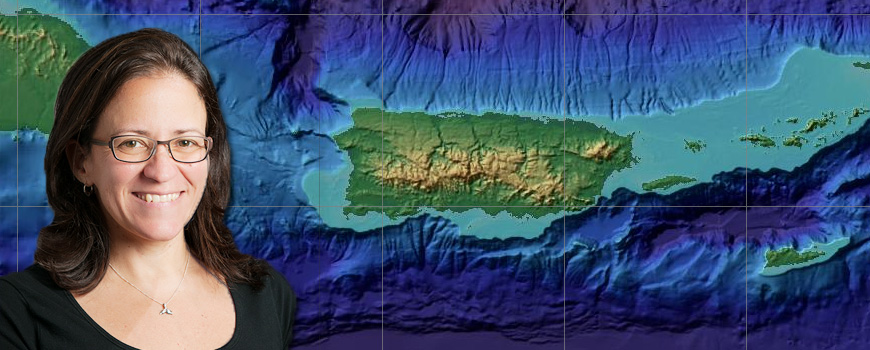Global S&T Development Trend Analysis Platform of Resources and Environment
| Faculty Profile: Isabel Rivera-Collazo Joins Scripps and UC San Diego | |
| admin | |
| 2017-02-09 | |
| 发布年 | 2017 |
| 语种 | 英语 |
| 国家 | 美国 |
| 领域 | 资源环境 |
| 正文(英文) |  Scripps/UC San Diego researcher Isabel Rivera-Collazo. Isabel Rivera-Collazo, an environmental archaeologist specializing in geoarchaeology, archaeomalacology, coastal and marine processes, maritime culture, and climate change, has recently joined faculty at UC San Diego’s Scripps Institution of Oceanography and the Department of Anthropology. Rivera-Collazo, a native of Puerto Rico, is an assistant professor of biological, ecological and human adaptations to climate change. Her research focuses on the effect that human activity has on island ecosystems through time, as well as how people have responded to climatic and environmental change in the past. Scripps welcomed an unprecedented 11 new faculty members to campus in 2016, and Rivera-Collazo was among five with joint appointments in other UC San Diego departments. These cross-disciplinary faculty appointments will help bridge Scripps science with other fields, enabling Scripps researchers and students to remain at the forefront of the university’s Understanding and Protecting the Planet (UPP) initiative. “When I got here and saw the environmental research and passion for research within Scripps and UC San Diego, it was very inspiring,” said Rivera-Collazo. “Actually, after the interview I went back home to Puerto Rico and finished a paper that had been sitting on my desk forever—so it was very productive!” As a coastal and marine archaeologist, Rivera-Collazo focuses on Puerto Rico and the Caribbean region, Israel, and the eastern Mediterranean. Her work highlights resilience and adaptation, investigating decisions that enhance or reduce adaptive success. She also takes an applied approach to research, working with local communities in the quest for understanding the current and expected impacts of climate change, including threats to coastal heritage. Prior to coming to Scripps and UC San Diego, Rivera-Collazo held a tenure-track position at the University of Puerto Rico (UPR), where she created from scratch a laboratory for environmental archaeology within the Department of Anthropology. She served as director of the laboratory for four years. She said she greatly enjoyed working at UPR, but as the only advanced underwater archaeologist in Puerto Rico, was feeling a lack of intellectual stimulation. “As a Puerto Rican, it was hard to leave the country that I’m fighting for, but now I have the opportunity to continue working in Caribbean and Puerto Rican archaeology and to train students at the PhD level,” said Rivera-Collazo. “I will be able to have a much more significant contribution to the archaeology of my nation from here than from within by helping train new scientists, and I can help bring the discussion to a higher level.” Rivera-Collazo’s passion for ocean science began when she was an undergraduate student at UPR, during which time she spent a summer in Israel and “fell in love” with marine archaeology. After obtaining her BA in anthropology, she studied marine archaeology at the University of Haifa in Israel, where classes were taught in Hebrew—a new language for Rivera-Collazo. She recalls the initial experience of taking classes such as coastal geomorphology in Hebrew as “shocking, but fun.” “I just went ahead and learned on the way,” she said. Rivera-Collazo notes that she didn’t finish her degree at the University of Haifa because, as she says, “life happened.” She got married and then became pregnant with the first of three children, at which point she moved back to Puerto Rico to try to finish her thesis from home. “I didn’t have any role models and I didn’t know that you could continue working while starting a family,” she said. “That’s why it’s very important for me now to be a role model to younger students, both male and female, so they know that they have options.” After starting a family, Rivera-Collazo worked at the Institute of Puerto Rican Culture, the highest governmental organization that regulates archaeology on the island, and she became director of the Program of Archaeology and Ethnohistory. Eventually, she decided that she wanted to return to academia and moved her family to England, where she earned a MSc degree in palaeoecology of human societies and a PhD in environmental archaeology, both from the Institute of Archaeology at University College London. Rivera-Collazo is currently teaching a brand-new introduction to marine archaeology course for undergraduates, and she looks forward to inspiring bright young minds of all academic disciplines in this beginner’s course. She said that she greatly enjoys mentoring students and pushing them to pursue their dreams. “One of the things I always tell them is that once you love what you’re doing, you are the best in what you’re doing because you are very demanding of the quality of your work,” said Rivera-Collazo. “I say, whatever you do, do it because you love it and not because of something else.” – Brittany Hook
This story appears in explorations now, Scripps Institution of Oceanography's award-winning ocean and earth science magazine. Sign up to receive our free monthly story roundup.
|
| URL | 查看原文 |
| 来源平台 | Scripps Institution of Oceanography |
| 文献类型 | 新闻 |
| 条目标识符 | http://119.78.100.173/C666/handle/2XK7JSWQ/107628 |
| 专题 | 资源环境科学 |
| 推荐引用方式 GB/T 7714 | admin. Faculty Profile: Isabel Rivera-Collazo Joins Scripps and UC San Diego. 2017. |
| 条目包含的文件 | 条目无相关文件。 | |||||
| 个性服务 |
| 推荐该条目 |
| 保存到收藏夹 |
| 查看访问统计 |
| 导出为Endnote文件 |
| 谷歌学术 |
| 谷歌学术中相似的文章 |
| [admin]的文章 |
| 百度学术 |
| 百度学术中相似的文章 |
| [admin]的文章 |
| 必应学术 |
| 必应学术中相似的文章 |
| [admin]的文章 |
| 相关权益政策 |
| 暂无数据 |
| 收藏/分享 |
除非特别说明,本系统中所有内容都受版权保护,并保留所有权利。
修改评论